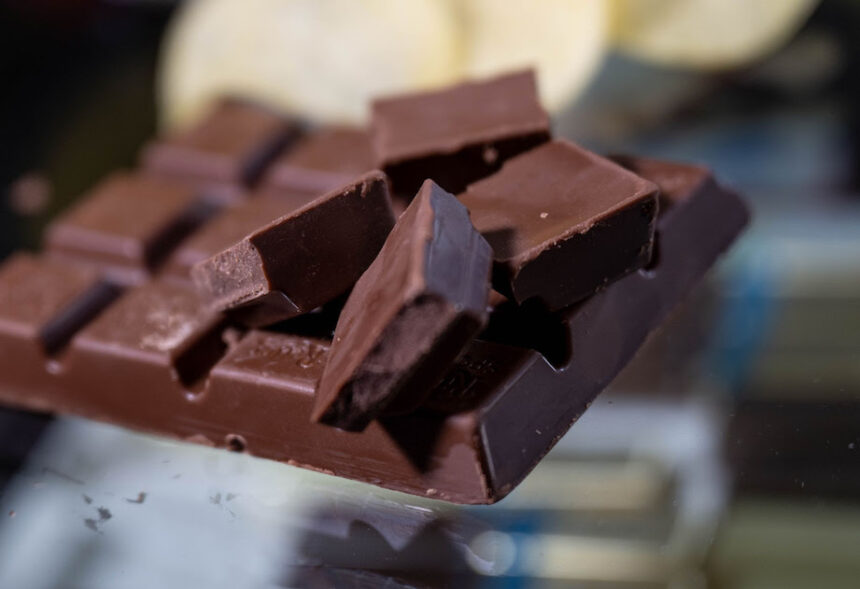Concern about chocolate bar over soaring price of cocoa

By Christian Rothenberg, dpa I Monday, Feb. 26, 2024
BERLIN – Since the price of a ton of raw cocoa on the London commodity exchange recently climbed to a record high of just under €5,500 ($5,960), chocolate fans have reason to be alarmed.
Just a year ago it was €2,500 and last month it was €4,000.
“A kilo of cocoa is almost €3 more expensive than it was a year ago,” a spokesman for the German chocolate manufacturer Ritter Sport said.
“Anyone can work out for themselves what this means for the production costs of a 100-gram chocolate bar, which contains between 35% and 70% cocoa, but we are currently assessing the situation as a whole,” he said.
The company does not want to say anything about possible price increases for anti-trust reasons. However a trade association executive is worried.
“Increased raw material prices and wages can lead to cost increases, which could tend to be passed on to the consumer,” said Solveig Schneider, deputy managing director of the Federal Association of the German Confectionery Industry (BDSI).
And in the United States, Hershey, one of the world’s largest sweets manufacturers, did not rule out a price increase.
Michele Buck, chief executive of the US company Hershey, one of the world’s largest confectionery manufacturers, did not rule out a price rise.
“Given where cocoa prices are, we will be using every tool in our toolbox, including pricing, as a way to manage the business,” chief executive Michele Buck said during a mid-February presentation of the chocolate giant’s results. Recent comments from her competitor, the Swiss food giant Nestlé, were similar.
The main reason why the price of cocoa has risen so sharply recently is that supply in the countries where it is grown is becoming increasingly scarce. Côte d’Ivoire and Ghana account for 60% of global cocoa production. Climate change is having a considerable impact on cultivation.
More frequent extreme weather events, such as long periods of drought, heavy rainfall and flooding have damaged the quality of the cocoa, reduced yields or completely destroyed harvests, the environmental organization WWF has said.
Prolonged periods of rain also lead to the spread of plant diseases such as CSSVD. The virus, which is spread by aphids, leads to the death of cocoa trees.
According to Kerstin Weber, environmental scientist at WWF, 17% of all areas under cultivation in Ghana are already affected, and CSSVD is also spreading to Côte d’Ivoire.
As cocoa trees are not resistant, the only effective treatment is to cut down infected trees and plant new ones, says Weber. The virus can spread so quickly because cocoa is usually planted in monocultures.
Another factor affecting chocolate production is the sharp rise in the price of sugar, which the German trade group BDSI says was up an annual 72% in the European Union in 2023. Cocoa butter prices rose by 52% and cocoa by 43%.
For competitive reasons, retailers are reluctant to talk about prices.
On the plus side, gobal demand is significantly greater than supply, says a spokesman for the German grocery store chain Rewe. But that won’t automatically translate into higher prices, he said.
Factors affecting prices include intense price competition, ongoing contracts, stockpiling by manufacturers and the actual cocoa content. Legally, a product can only be called chocolate if the proportion is at least 35%. In Germany annual per capita chocolate consumption has been stable at 9.3 kilos in 2023, according to BDSI.
New price increases are clearly not deterring many people. In a recent Yougov survey, 51% stated that their chocolate consumption would remain unchanged, while 37% would eat less.
“Manufacturers and retailers know that consumers pay less attention to the price of luxury products such as chocolate. That’s why they are particularly keen to increase prices,” says food expert Armin Valet.
In the past, chocolate has regularly become more expensive even without an increase in raw material prices, he said noting that the price has tripled in the last 20 years.
The cocoa shortage is unlikely to be a temporary phenomenon. The WWF pointed to studies showing that production in Africa could fall even more sharply because the majority of the land used for cultivation will be much less suitable in future.
For many cocoa farmers, who often live in poverty, this would mean the loss of an important source of income. Currently, only around 6% of the price of an average chocolate bar goes to the farmers.

